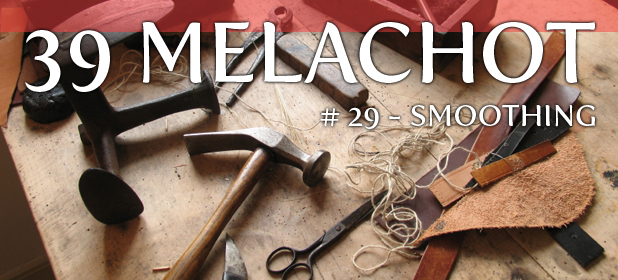After tanning, the hides had to be scraped to remove any stray hair. Scraping a surface to make it smooth is the melacha of m’macheik. This melacha is not limited to animal hides and similar items; sanding a block of wood or scrubbing a pot with steel wool are likewise m’macheik. Even using bar soap on Shabbos involves issues of m’macheik.
M’macheik has a toldah (a subordinate activity) called m’marei’ach, translated as “smearing.” This applies to soft and pliable substances, such as wax, caulk or Vaseline. Because of m’marei’ach, one might not be able to use a variety of creams and ointments on Shabbos, possibly including toothpaste and hand lotion, according to the authority consulted. Even “liquid” soap may be problematic according to some opinions if the consistency is too thick. (A pure liquid that runs freely, however, is permissible. Diluting hand soap and dish-washing liquid prior to Shabbos renders it acceptable to all authorities.) Since the acceptable level of viscosity varies widely among the authorities, consult your own rabbi for guidance in this matter.
Under certain conditions, it may be permissible to use the rabbinically-restricted creams, for example if an infant requires diaper cream for a rash. In such circumstances, the cream should be placed on the affected area without spreading it. This is permitted even though applying the diaper or bandage may later cause the cream to “smear” itself.
As with many other melachos, m’macheik does not generally apply to foods. Therefore, one may spread peanut butter, margarine and similar foods in the normal fashion. However, the melacha does apply to food when it comes to presentation. Accordingly, one may not smooth platters of tuna salad (for example) for decorative purposes.
This is just an introduction to the concepts of the melacha of m’macheik; it is not a substitute for a full study of the halachos.

